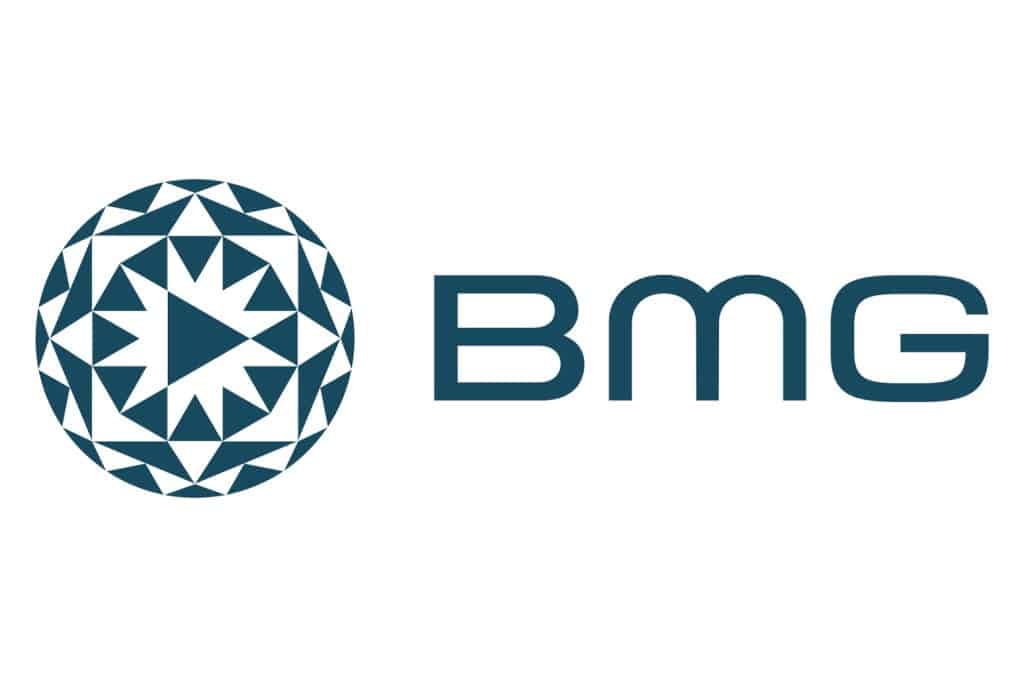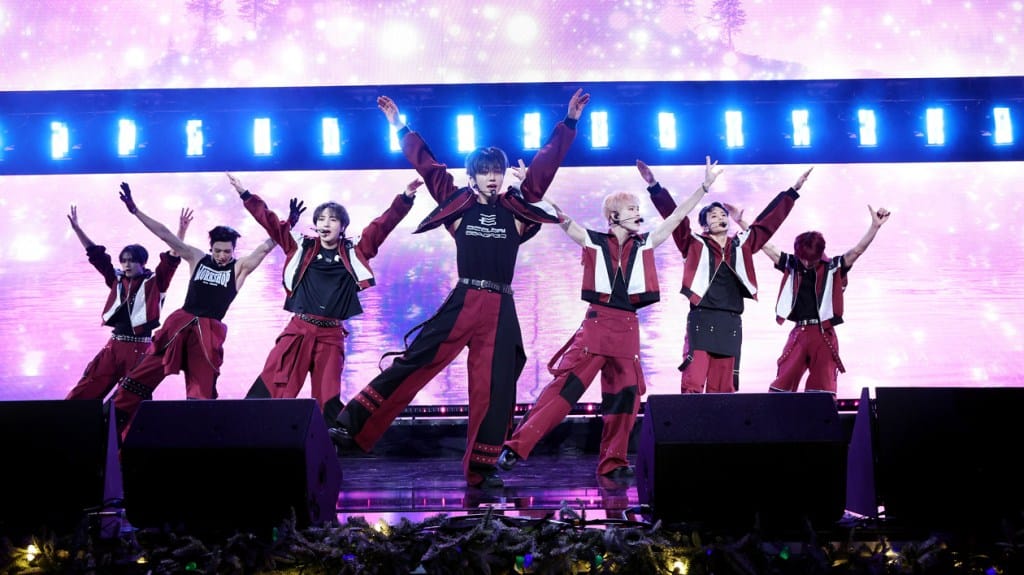Business News
Page: 38
BMG has a new look, with the company unveiling their fresh brand identity as part of their continuing BMG Next strategy.
Unveiled on Thursday (Feb. 13), the new branding is described as a “significant milestone” for the Berlin-based company’s evolution as a leader in the global industry. Dubbed a “comprehensive refresh”, the nascent design is said to represent the company’s bold approach to continuity and innovation, while still honoring its heritage.
“BMG has been through a significant transformation, and our refreshed brand reflects that journey,” said BMG CEO Thomas Coesfeld. “From the beginning, we’ve been a forward-thinking music company. Now, we’re building on that foundation with a renewed focus on innovation and creativity. Our vision is to contribute to a world where music makes a lasting impact. By uniting creative intuition with cutting-edge technologies, we empower our clients and partners to achieve long-term success.”
The new redesign is part of the company’s BMG Next strategy. Launched in 2023, it’s described by BMG as emphasizing a localized yet globally scalable approach. As Coesfeld explained in 2024, it’s “local where necessary, global where possible”.
Trending on Billboard
The brand identity update features a new symbol and an updated color scheme, moving away from the red color that has become associated with BMG for many years. According to a press release, the symbol is designed to bring “energy and movement” to the company’s visual identity, while still reinforcing its status as a modern music company that continues to integrate services related to music publishing and recorded music.
“While the BMG logo remains the same, our new symbol and brand hero colors reflect the company’s dual commitment to stability and forward-thinking innovation,” explained BMG Executive Vice President of Corporate Communications Kristal McKanders Dube. “‘Midnight,’ a deep emerald-blue, represents parent company Bertelsmann’s enduring commitment to music and BMG’s independent strength. The accent colors—‘Limelight,’inspired by the iconic stage spotlight, and ‘Platinum,’ along with other metallic tones, pay tribute to the industry’s highest achievements.”
“Our new visual identity isn’t just about aesthetics—it’s a statement of intent,” added Coesfeld. “At its core, it redefines our ambition and who we are today: we put artists and songwriters at the heart of everything we do. We embrace technology, collaborate with an ecosystem of partners, and stay true to our distinctive approach to artist advocacy.
“With the implementation of our BMG Next strategy, we have reached a new level in how we deliver for music creators, how we partner with the industry, and how we operate as a whole.”
The brand identity refresh was developed in collaboration with global brand consultancy Wolff Olins, and its launch coincides with the unveiling of BMG’s first phase of a redesigned website, which aims to showcase its offerings while celebrating the achievements of its artists and songwriters.
Universal Music Group (UMG) and Nashville-based non-profit Music Health Alliance (MHA) are expanding their relationship to launch the Music Industry Mental Health Fund, which will provide comprehensive, high-quality outpatient mental health resources for music industry professionals across the United States, it was announced Thursday (Feb. 13).
The new partnership, which builds upon the healthcare access program launched by UMG and MHA in April 2021, will provide a range of mental health services, including individualized recommendations for mental health professionals; grants to help offset costs; and funding resource recommendations to ensure continuity of care through additional financial and mental health support. Clients from UMG and beyond will have access to MHA’s team of advocates, with initial inquiries receiving a response within 24 hours.
“Music Health Alliance possesses the comprehensive resources necessary to address the full spectrum of mental health needs for music industry professionals,” said MHA founder/CEO Tatum Hauck Allsep in a statement. “This includes financial assistance, a continuum of care for both mental and physical health, and wraparound services such as psychiatric support, facilitation of intensive outpatient and inpatient programs, and data collection. MHA’s holistic approach ensures a long-term commitment to the health, well-being, and sustainability of the music industry workforce.”
Trending on Billboard
Services will be open to current and former music professionals, including those outside of UMG.
“We have been working on ways to establish a streamlined pathway for mental health access, funding and care planning,” said UMG chief impact officer Susan Mazo. “Growing and continuing our partnership with Tatum and the Music Health Alliance was the most natural way to ensure continuous and effective mental health support for anyone working in our industry.”
In addition to the expanded services, MHA offers a full spectrum of mental health and healthcare advocacy services, including dental care resources via the Richard M. Bates SMILE Fund, group health services, healthcare advocacy and confidential guidance. MHA, which boasts more than 32,000 members from across the music community, also offers individual/family healthcare insurance, senior care support via Price Legacy Fund and vision care resources.
According to UMG and MHA, the entities’ earlier healthcare access program, which provides a healthcare concierge to clients, has served nearly 1,000 clients to date and saved them more than $12.5 million in healthcare costs.
Sony Music reported 14% revenue growth in the quarter ending last year — or total revenue of 482 billion yen ($2.72 billion) — bolstered by big releases from ATEEZ and Tyler, the Creator and subscription streaming growth across recorded and music publishing divisions, its parent company Sony Group Corp., reported Thursday (Feb. 13). Sony Music’s […]
After Chappell Roan was criticized by a former music industry executive for her speech at the 2025 Grammys, the singer encouraged the music industry’s power players to join her in raising money for artists’ healthcare coverage. Now, it appears that the industry listened.
On Monday (Feb. 10), Roan officially partnered with the non-profit Backline to launch the We Got You campaign, a fundraising initiative aimed at “supporting accessibility of health care for artists,” according to its donation page. In an Instagram Stories post revealing the partnership, Roan added that she had donated $25,000 to the campaign — with fellow artists Charli XCX and Noah Kahan matching her donation — and urged industry executives to do the same.
“Fans, y’all don’t have to donate a damn penny,” she said in the post. “This is one of many opportunities for the industry powers to show up for artists. There is much more work to be done.”
Trending on Billboard
According to We Got You’s donations page, multiple major music companies and executives matched Roan’s donations. Public $25,000 contributions from Live Nation, AEG Global Touring, Wasserman Foundation and Hinterland Music Festival are listed among the campaign’s supporters, as well as matching donations from Sumerian Records founder/CEO Ash Avildsen and talent manager Guy Oseary.
“Thanks Chappell Roan for inspiring change,” read a noted shared alongside AEG’s donation. Avildsen added, “Sumerian Records always strives to be on the right side of history. Then. Now. Forever.”
In a statement shared to their Instagram, Hinterlands Music Festival commended Roan, Kahan and Charli XCX for publicly supporting “adequate support” for artists. “Without great artists, there are no music festivals,” the organization wrote. “As an independent music festival, we are dedicated to continuing to support and advocate for the well-being of all musicians, no matter their industry success. WE GOT YOU!!”
“This surge in advocacy marks a turning point in our journey as an organization,” said Backline executive director Hilary Gleason in a statement sent to Billboard on Wednesday (Feb. 12). “We are thrilled to see artists, industry leaders, and corporations take action to invest in the health and wellness of the music industry professionals who make it all happen. The awareness alone will have a significant impact for the music community in 2025 and beyond.”
In her own statement shared shortly after the campaign was launched, Backline community manager Terra Lopez praised Roan for helping the organization raise vital funding for artists’ health. “The We Got You campaign is a powerful step in prioritizing mental health and well-being of those who make the music we all love,” she wrote. “Thank you to Chappell Roan, Charli xcx, and Noah Kahan for your advocacy and action to create a more supportive industry — together, we are showing artists they are seen, heard, and cared for.”
Roan’s $25,000 donation was first revealed in a response the artist wrote to former A&R executive Jeff Rabhan, who criticized the singer’s call for label-provided healthcare at the 2025 Grammys. “@jeffrabhan wanna match me $25K to donate to struggling dropped artists?” she wrote on her Instagram Stories last week. “I love how in the article you said ‘put your money where your mouth is.’ Genius !!! Let’s link and build together and see if you can do the same.” At press time, none of the public donations to the campaign bear Rabhan’s name.
After investing several hundred million dollars in labels and management companies, Firebird Music has entered into its first partnership with an artist — the U.K. rocker Yungblud — on a new company, YB Inc.
For Yungblud, this alliance offers an opportunity to expand his pursuits outside of recorded music, which already include Bludfest, a festival, and Beautifully Romanticized, Accidentally Traumatized, a fashion brand. “This is a new type of venture for both of us, which is very exciting,” the artist says via email. “Building and scaling a music festival, a 360 lifestyle business — including physical stores and a music venue — and starting a clothing brand all need resources.” And Firebird has a large war chest — Nat Zilkha, the company’s co-founder and executive chairman, told Billboard in 2023 that it has access to over $1 billion in equity.
For Firebird, teaming up with Yungblud furthers the company’s goal of “support[ing] any entrepreneur who has vision and aspirations, but needs capital, expertise, infrastructure and support,” according to Zilkha. “Through his recorded music and touring, merchandise, fashion line, brand deals and festival,” Zilkha adds, “Yungblud has built one of the largest and most successful businesses in the world.”
Trending on Billboard
Zilkha launched Firebird in 2022 with Nathan Hubbard, who previously served as CEO of Ticketmaster. Initially, the company focused on investing in labels (including Defected Records and Transgressive Records), management companies (including Red Light and Mick Management) and publishers (Tape Room, One Two Many Music), often acquiring majority stakes, according to Zilkha.
For Defected, a dance music label, “Firebird’s investment provides capital that allows us to scale — whether that be through A&R expansion, catalogue acquisitions, technological advancements, or other efforts,” says CEO Wez Saunders. “The partnership removes financial constraints that independent labels often face when competing with major label-backed entities.”
On top of that, Saunders continues, “Firebird is known for leveraging technology, analytics and audience engagement strategies. This allows Defected to enhance its data-driven approach to artist development and fan engagement — areas where major labels often hold a competitive advantage.” (“For any of these individual companies to spend the kind of money that we’re spending on our data analytics team would be cost prohibitive,” Zilkha said previously. “But we can spread that cost across all of the different companies.”)
Firebird has also wanted to work directly with acts. “There’s an opportunity to create a new kind of partner for artists, one that is fully aligned across everything they do,” Zilkha told Billboard in 2023. The music industry “is stuck in silos” — most labels take a cut of an artist’s streaming and sales income, for example, but not their touring income. That means the record company has little incentive to help build an act’s touring operation, which “under-optimizes the investment behind an artist,” according to Zilkha.
By partnering with stars across all their various revenue streams, Firebird is theoretically freed up to take a different approach to career building. “It might be that we lose money on the distribution or recorded music, but that’s okay, because we’re partnering with the artist in a lot of other places where she or he may be reaching their fans,” Zilkha explained.
Yungblud is signed to Interscope Capitol Labels Group, but he will funnel his earnings into YB Inc, which he owns jointly with Firebird, according to Bloomberg. This strategy “allows me to manage the risk, but enables my projects to breathe and grow,” Yungblud says. “My managers and I can focus on getting the proposition and execution just right, while keeping our fundamental values in place, and without rushing or skipping important steps.”
Zilkha hopes to strike more similar partnerships soon. “As Firebird continues to scale and bring on more artists,” he says, “the diversity across artists will be paired with that added benefit of also being diversified across revenue streams.”
Ludacris signed with UTA for representation in all areas, including music, film/TV and other ventures. The rapper is still repped by Cara Lewis Group for concert bookings in the U.S. He’s managed by Chaka Zulu and Jeff Dixon of Ebony Son Entertainment and attorney Darrell Miller of Fox Rothschild.
Longstanding electronic music producer Seven Lions signed with Los Angeles-based artist management company MLennial, with the partnership focused on all of the artist’s future endeavors, including global touring. Launched a year ago, MLennial is run by founder Mike Lisanti, formerly the COO of Prodigy Artists, and focuses on multi-genre DJs and producers in dance and bass music. “Jeff (Seven Lions) has been one of my favorite artists since the start of my journey in the music industry,” says Lisanti. “His win in the Above & Beyond ‘You Got To Go’ remix contest on Beatport inspired me to enter similar competitions for exposure back in 2012. At the time, I was part of Charity Strike, and my duo partner and I went on to win two Beatport contests shortly after Jeff’s iconic entry. That moment kickstarted my entire career in the industry. Now, managing Seven Lions at the company I’ve built from the ground up feels not only full circle but truly surreal. We’re thrilled to unveil this new chapter for Seven Lions and are committed to serving both longtime and new fans through a fresh, innovative lens.” – Katie Bain
Grammy- and Oscar-winning rapper, actor, author and activist Common signed with CAA and Anonymous Content. He continues to be represented by Ceremony Music Group, The Lede Company, SMAC Entertainment, and Myman Greenspan Fox Rosenberg Mobasser Younger & Light.
Trending on Billboard
McFly signed to Absolute Label Services for the release of the U.K. pop group’s “21st birthday album,” 21 LIVE. The release follows the ITV music special McFLY: The 21st Birthday Party, which was recorded at The O2. This will be the band’s fourth album released through Absolute.
Hawaiian country artist Maoli signed with ONErpm and Huff Co., which formed a joint venture last year. He’s set to release the album Last Sip of Summer on June 27 and recently embarked on a tour that will hit New Zealand, Australia, the U.S. and Canada.
Bluegrass band The Steeldrivers signed with Sun Records, which will release the group’s new self-produced album, Outrun, on May 23.
Universal Music Group Greater China signed an exclusive, multi-year global agreement with Chinese pop star Liu Han, who has been making music in the country for four decades. The deal marks the first time that his “majority body of work,” both recording and publishing rights, will be under a single umbrella, according to a press release. “Liu Huan is a towering figure in contemporary Chinese music history, and we are proud to support his journey in sharing his extraordinary music with the world,” Adam Granite, Universal Music Group executive vp of market development, said in a statement on the deal.
DJ and producer Netsky signed with One World Artists, the official artist agency of Tomorrowland, for global management representation. The drum and bass pioneer recently released the new single “California.”
HSquared Management signed Juno Award-winning artist Jordan St. Cyr. The signing of the “Rescue” hitmaker marks the company’s second joint signing since industry executives Kelli Haywood and Leigh Holt launched the company last year. – Jessica Nicholson
Pitbull’s Mr. 305 Records signed Cuban singer-songwriter and producer WhiteStar, who is regarded as one founders of the Bajo Mundo movement alongside Farruko and IAmChino. Under the deal, WhiteStar seeks to “expand this movement while exploring new musical horizons,” according to a press release. His contributions to the Bajo Mundo genre, a style that blends reggaetón, guaracha, dembow and EDM, include projects like Farruko’s mega hit “Pepas” and “Helicóptero” by El Alfa. “Joining Mr. 305 Records is a blessing, and a dream come true,” WhiteStar said in a statement. “I’ve always known I had the potential to be a star, and this is the right time to focus on my solo career. I’m excited to work with a label I’ve always admired, one that has played a key role in my development as a songwriter.” – Griselda Flores
The Ophelias signed with Get Better Records, which is set to release the band’s Julien Baker-produced album Spring Grove on April 4. Baker sings harmonies and plays instruments throughout the album, according to a press release. The Ophelias is composed of Spencer Peppet (guitar & vocals, she/her), Mic Adams (drums, he/him), Andrea Gutmann Fuentes (violin, she/her), and Jo Shaffer (bass, they/she).
Sophia Talamas, a content creator with more than 30 million followers on social media who last year participated in the influencers’ panel at Billboard Latin Music Week, signed a record deal with Sony Music Latino and will release her first single on Feb. 21. “This song is called ‘Funeral’ and is based on ‘real events’,” Talamas tells Billboard, adding that she has been working with Sony for over a year. “It’s not that easy to release a 1st song. I have learned to have a lot of patience, especially when you also have to complement or go from influencer to artist,” she adds. “When the 2nd one comes, it should be easier and faster.” – Isabela Raygoza
Mom+Pop Music signed alt-country supergroup Chaparelle, which released a new song, “Devil’s Music,” on Jan. 31. The group — composed of Zella Day, Jesse Woods and Beau Bedford — will be releasing new music throughout the year and is slated to kick off a 2025 tour on April 3. Chaparelle is managed by Jack Gallagher and Fiona Dolan at OPEN Management.
Lyor Cohen, YouTube’s global head of music and the former president at Def Jam Recordings, head of Warner Music Group’s recorded music division and founder of 300 Entertainment, has penned an urgent open letter to Ye — formerly known as Kanye West — imploring him to stop using antisemitic rhetoric and other actions following a […]
K-pop company SM Entertainment used a healthy concert business to compensate for a slow new release schedule in posting revenue of 273.8 billion won ($189 million) in the fourth quarter of 2024, up 9% year over year, according to the company’s latest earnings report. Operating profit nearly tripled to 33.9 billion won ($23 million) and net loss was more than halved to 24.1 billion won ($17 million).
Recorded music revenue dropped 5.1% to 86.0 billion won ($59 million) due to a decrease in new album sales, which came in at 3.78 million units versus 5.51 million units in the prior-year period. NCT Dream sold 1.56 million units while Aespa had 1.1 million album sales in the quarter. Elsewhere, WayV sold 400,000 units and Irene sold 360,000 units.
Concert revenue grew 11.9% to 22.5 billion won ($15.5 million) thanks to an expanded tour schedule during the quarter. Exo’s Chanyeol performed 14 solo shows across Southeast Asia, Japan and China. NCT Wish performed 12 in Asia. NCT Dream, which began its world tour in the second quarter, played nine concerts in the fourth quarter. The higher number of concerts, as well as an increase in special events such as pop-up stores, helped merchandise and licensing revenue jump 33.7% to 51.2 billion won ($35.3 million).
Trending on Billboard
In the first quarter, music releases include SMTOWN’s 30th anniversary album, SMTOWN, THE CULTURE, THE FUTURE, on Friday (Feb. 14). Red Velvet’s Seulgi and WayV’s Ten are also both due to release EPs, and a new girl group, Hearts2Hearts, will debut on Feb. 24 with the single “The Chase.”
This year, SM Entertainment is celebrating its 30th anniversary with a new slogan (“The Culture, The Future”), new films, new broadcast programs and SMTOWN LIVE 2025 World Tour concerts around the globe. “’THE CULTURE’ represents the legacy and cultural heritage that SM has built over the past three decades,” CEO Jang Cheol-hyuk said during the earnings call. “‘THE FUTURE’ embodies our ambition to drive innovation in the global music industry and lead the next era of K-pop. At SM, music is at the heart of everything we do. Through our music and cultural influence, we strive to remain a meaningful part of people’s daily lives. This slogan underscores our commitment to pioneering the future of K-pop while honoring the foundation we’ve built.”
In addition to announcing fourth-quarter results, SM Entertainment revealed that its board of directors approved the retirement of the remaining treasury shares, which are shares the company has repurchased from shareholders and holds on its books. The remaining treasury shares equal 2% of outstanding shares and are valued at 40.3 billion won ($27.8 million). Last February and August, the company retired more than 35 billion won ($24.1 million) worth of treasury shares.
SM Entertainment shares rose 2.9% to 95,000 won ($65.42) on Tuesday (Feb. 11) following the earnings release and announcement of the share retirement. Year-to-date, SM Entertainment stock has risen 25.7%.
Winter Music Conference 2025 has announced a long phase one list of speakers for its March event in Miami.
The dance industry conference, returning to Miami Music Week for the first time since 2019, will feature input from artists including Aluna, LP Giobbi, Hayla, Sydney Blu and more.
Additionally, programming will include more than 60 industry representatives from a wide range of labels, management companies, agencies, publications, streaming services and more. See the complete list of phase one names and companies below.
Panels themes, keynote speakers and more will be announced in the coming weeks, with the event also set to feature mixers, a pool party and workshops, along with the inaugural hybrid awards show from the EDMAs and IDMAs. The Conference and tangential events will happen at Eden Roc Miami Beach Resort on March 26-28. Tickets are on sale now.
Trending on Billboard
Winter Music Conference is owned by Ultra Music Festival, which kicks off in Miami the same day the conference ends, Friday, March 28. Launched in 1985, Winter Music Conference was held every March in Miami (prior to the pandemic) and is part of the larger event known as Miami Music Week, a marathon of dance music performances and parties. Drawing an estimated 100,000 attendees and 3,500 music professionals from more than 70 countries at its height, WMC hosts a schedule of events, parties, seminars and workshops and serves as one of the largest industry networking events in the dance/electronic music genre.
Though the Ultra Music Festival was originally spawned by the conference, it eventually surpassed it in terms of influence, and its parent company went on to acquire WMC in 2018.
Winter Music Conference 2025 Industry Speakers:
Alex Greenberg – Falcon PRAlex Jukes – Jukebox PR/The TribesAndy Daniell – Defected RecordsAnna Horowitz – WMEBina Fronda – Ultra RecordsBlake Coppelson – Proximity II Kompass Music GroupCameron Sunkel – EDM.comCandace Silva-Torres (p/k/a SiLVA) – KCRWaCarly Peterson – CircaCelena Fields – EVENChris Johnson – SoundCloudChuck Fishman – Soul Clap RecordsConnie Chow – FUGA II shesaid.so AMSCristiana Votta – Alegria AgencyDani Chavez – Good Girl ManagementDani Deahl – BandLabDanny Klein – SPIN Magazine II Robot SunriseDavid Waxman – Ultra RecordsDeron Delgado – EMPIRE Dance/DirtybirdDilini Weerasooriya – Merrill Wealth Management (Bank of America)Dorothy Caccavale – FM Artists/Three Six ZeroEddie Sears – Republic RecordsElyn Kazarian – Women In Visuals/dublabEmma Hoser – Liaison ArtistsEric Silver – Red Light ManagementEryk Puczek – FriendsOfFriends.AgencyGavin Ryan – Big Beat Records/Atlantic RecordsGeorge Hess – G5 EntertainmentGina Tucci – 146 RecordsHallie Halpern – SeriouslyHallie StudiosHarmony Soleil – c895 SeattleHilary Gleason – BacklineJason Adamchak – Calculated Creative AgencyJaye Hamel – 1of1 CustomJeroen te Rehorst – BEAT Music Fund/ArmadaJess Page – RareformJordyn Reese – Do Better For ArtistsKat Bein – Super Kat WorldKatie Bain – BillboardKatie Knight – Can U Put Me On Guestlist PodcastKyle Jones – EDM.comLauren Anderson – LabelWorxLewis Kunstler – 2 + 2 Management II Young Art RecordsLorne Padman – Dim Mak RecordsMatt Sherman – Sherm In The Booth Podcast II Hood Politics RecordsMegan Venzin – DJ MagNicholas Saady – Pryor Cashman LLPOlivia Mancuso – Elevated Frequencies PodcastOllie Zhang – 88risingPaula Quijano – Little Empire MusicPete Anderson – ETP AgencyPeter Slayton – Slayton CreativeSam Mobarek – Major Recordings (Warner Records)Seth Shapiro – Shapiro Legal, PLLCShannon Herber – Wise River ConsultingSilvia Montello – Voicebox ConsultingSimon Scott – Cirkay LTDSonya Okon – Helix Records/Ultra PublishingSteph Conlon – Easier SaidTaryn Haight – WassermanTom Williams – L’Affaire MusicaleVivian Belzaguy Hunter – Ultra Music Festival II Ascendance Sustainable EventsWatse de Jong – Manager, Martin GarrixWill Scott – Helix Records / Ultra Publishing
02/11/2025
Check out all the answers from this year’s honorees, including Usher, WNBA star Angel Reese and football legend Shannon Sharpe.
02/11/2025

 State Champ Radio
State Champ Radio 










